新概念英语第一册第73课Lesson73课文单词知识点
- 格式:doc
- 大小:92.50 KB
- 文档页数:1
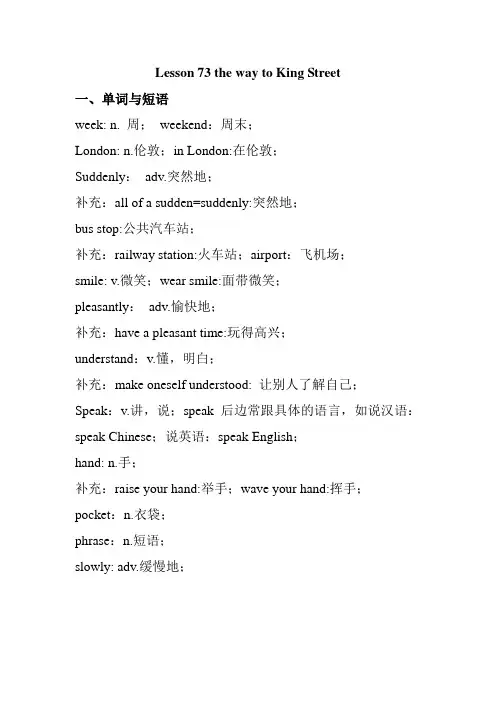
Lesson 73 the way to King Street一、单词与短语week: n. 周;weekend:周末;London: n.伦敦;in London:在伦敦;Suddenly:adv.突然地;补充:all of a sudden=suddenly:突然地;bus stop:公共汽车站;补充:railway station:火车站;airport:飞机场;smile: v.微笑;wear smile:面带微笑;pleasantly:adv.愉快地;补充:have a pleasant time:玩得高兴;understand:v.懂,明白;补充:make oneself understood: 让别人了解自己;Speak:v.讲,说;speak后边常跟具体的语言,如说汉语:speak Chinese;说英语:speak English;hand: n.手;补充:raise your hand:举手;wave your hand:挥手;pocket:n.衣袋;phrase:n.短语;slowly: adv.缓慢地;二、短语、句型及语法1、She does not know London very well, and she lost her way.他对伦敦不很熟悉,因此迷了路;在本句中有两个知识点需要引起注意:①know、、、well:对、、、了解,例:I know him very well.我非常了解他;I do not know the book very well.我对这本书不是很了解。
②关于与way相关的几个重要短语:lose one′s way: 迷路;I lost my way yesterday:昨天我迷路了;on the way to、、、在去、、、的路上;例:Tom is on the way to school now.汤姆现在正在去学校的路上。
by the way:顺便提一下,顺便问一下,例:By the way, I have something to tell you.我顺便有些事情想告诉你。
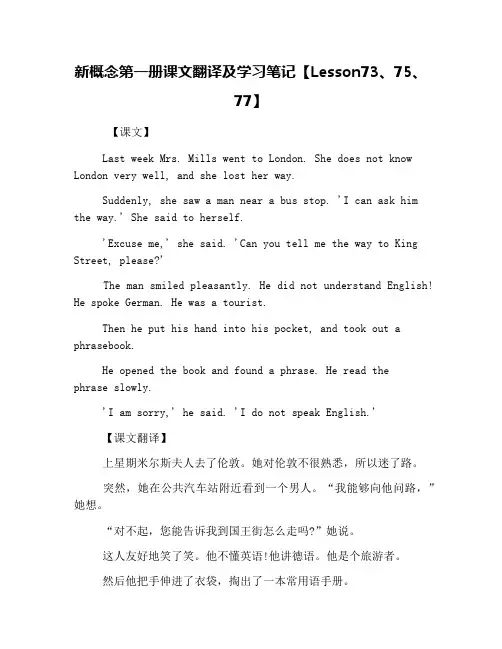
新概念第一册课文翻译及学习笔记【Lesson73、75、77】【课文】Last week Mrs. Mills went to London. She does not know London very well, and she lost her way.Suddenly, she saw a man near a bus stop. 'I can ask him the way.' She said to herself.'Excuse me,' she said. 'Can you tell me the way to King Street, please?'The man smiled pleasantly. He did not understand English! He spoke German. He was a tourist.Then he put his hand into his pocket, and took out a phrasebook.He opened the book and found a phrase. He read thephrase slowly.'I am sorry,' he said. 'I do not speak English.'【课文翻译】上星期米尔斯夫人去了伦敦。
她对伦敦不很熟悉,所以迷了路。
突然,她在公共汽车站附近看到一个男人。
“我能够向他问路,”她想。
“对不起,您能告诉我到国王街怎么走吗?”她说。
这人友好地笑了笑。
他不懂英语!他讲德语。
他是个旅游者。
然后他把手伸进了衣袋,掏出了一本常用语手册。
他翻开书找到了一条短语。
他缓慢地读着短语。
“很抱歉,” 他说,“我不会讲英语。
”【生词】week n. 周London n. 伦敦suddenly adv. 突然地bus stop 公共汽车站smile v. 微笑pleasantly adv. 愉快地understand (understood ) v. 懂,明白speak (spoke ) v. 讲,说hand n. 手pocket n. 衣袋phrasebook n. 短语手册,常用语手册phrase n. 短语slowly adv. 缓慢地【知识点讲解】在新概念一的课本里,73课前面有一个小测试,有书的同学能够自己做一下检验一下学到现在的水平。
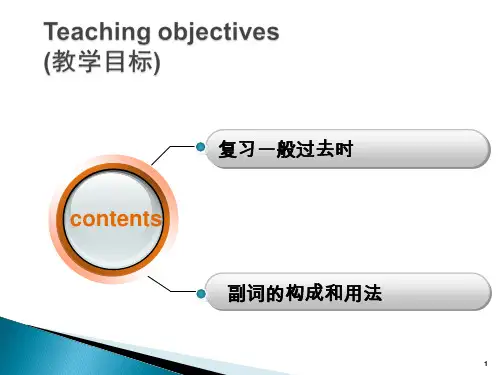
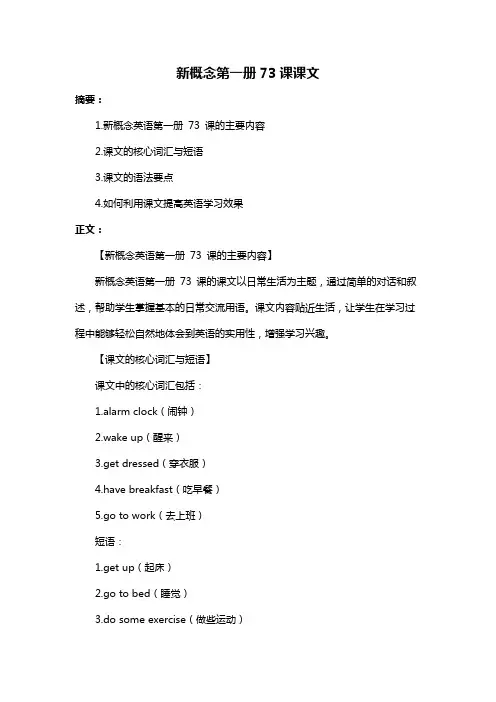
新概念第一册73课课文摘要:1.新概念英语第一册73 课的主要内容2.课文的核心词汇与短语3.课文的语法要点4.如何利用课文提高英语学习效果正文:【新概念英语第一册73 课的主要内容】新概念英语第一册73 课的课文以日常生活为主题,通过简单的对话和叙述,帮助学生掌握基本的日常交流用语。
课文内容贴近生活,让学生在学习过程中能够轻松自然地体会到英语的实用性,增强学习兴趣。
【课文的核心词汇与短语】课文中的核心词汇包括:1.alarm clock(闹钟)2.wake up(醒来)3.get dressed(穿衣服)4.have breakfast(吃早餐)5.go to work(去上班)短语:1.get up(起床)2.go to bed(睡觉)3.do some exercise(做些运动)4.take a shower(洗淋浴)【课文的语法要点】本课的语法要点主要涉及一般现在时态的用法。
一般现在时态用于表示经常或习惯性的动作,或者用于描述客观事实。
在课文中,我们可以看到一些一般现在时态的句子,如:I get up at six o"clock.(我六点钟起床。
)She goes to work by bus.(她乘公交车去上班。
)【如何利用课文提高英语学习效果】1.熟读课文,理解其中的日常用语和语法结构,加强自己的口语表达能力。
2.记忆核心词汇和短语,丰富自己的词汇量,为日后的英语学习打下基础。
3.模仿课文中的对话,与同学或老师进行角色扮演,提高英语口语的实际运用能力。
4.通过练习,学会如何运用一般现在时态描述日常生活中的习惯和客观事实。
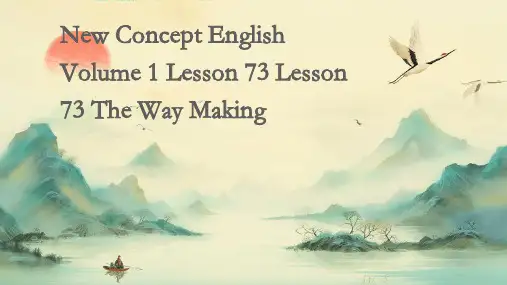
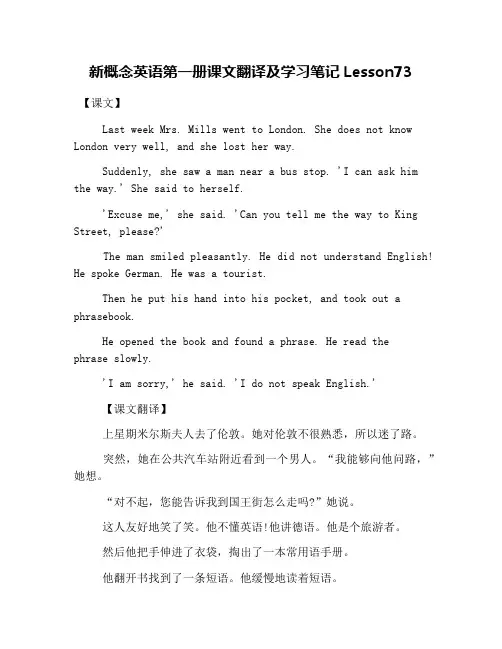
新概念英语第一册课文翻译及学习笔记Lesson73【课文】Last week Mrs. Mills went to London. She does not know London very well, and she lost her way.Suddenly, she saw a man near a bus stop. 'I can ask him the way.' She said to herself.'Excuse me,' she said. 'Can you tell me the way to King Street, please?'The man smiled pleasantly. He did not understand English! He spoke German. He was a tourist.Then he put his hand into his pocket, and took out a phrasebook.He opened the book and found a phrase. He read thephrase slowly.'I am sorry,' he said. 'I do not speak English.'【课文翻译】上星期米尔斯夫人去了伦敦。
她对伦敦不很熟悉,所以迷了路。
突然,她在公共汽车站附近看到一个男人。
“我能够向他问路,”她想。
“对不起,您能告诉我到国王街怎么走吗?”她说。
这人友好地笑了笑。
他不懂英语!他讲德语。
他是个旅游者。
然后他把手伸进了衣袋,掏出了一本常用语手册。
他翻开书找到了一条短语。
他缓慢地读着短语。
“很抱歉,” 他说,“我不会讲英语。
”【生词】week n. 周London n. 伦敦suddenly adv. 突然地bus stop 公共汽车站smile v. 微笑pleasantly adv. 愉快地understand (understood ) v. 懂,明白speak (spoke ) v. 讲,说hand n. 手pocket n. 衣袋phrasebook n. 短语手册,常用语手册phrase n. 短语slowly adv. 缓慢地【知识点讲解】在新概念一的课本里,73课前面有一个小测试,有书的同学能够自己做一下检验一下学到现在的水平。
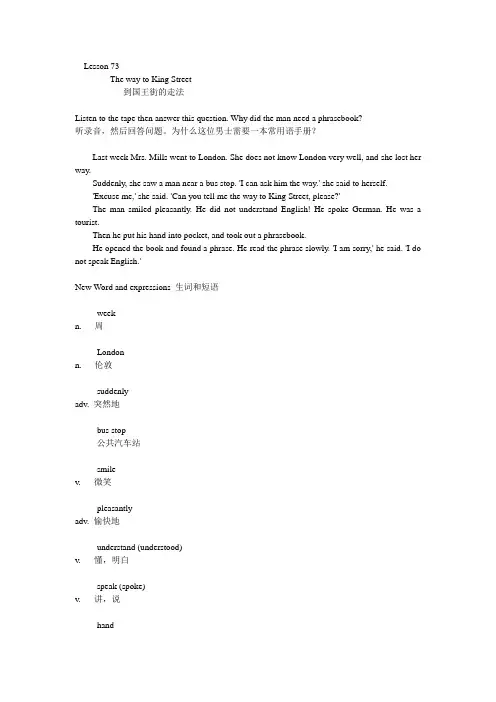
Lesson 73The way to King Street到国王街的走法Listen to the tape then answer this question. Why did the man need a phrasebook?听录音,然后回答问题。
为什么这位男士需要一本常用语手册?Last week Mrs. Mills went to London. She does not know London very well, and she lost her way.Suddenly, she saw a man near a bus stop. 'I can ask him the way.' she said to herself.'Excuse me,' she said. 'Can you tell me the way to King Street, please?'The man smiled pleasantly. He did not understand English! He spoke German. He was a tourist.Then he put his hand into pocket, and took out a phrasebook.He opened the book and found a phrase. He read the phrase slowly. 'I am sorry,' he said. 'I do not speak English.'New Word and expressions 生词和短语weekn. 周Londonn. 伦敦suddenlyadv. 突然地bus stop公共汽车站smilev. 微笑pleasantlyadv. 愉快地understand (understood)v. 懂,明白speak (spoke)v. 讲,说handn. 手pocketn. 衣袋phrasebookn. 短语手册,常用语手册phrasen. 短语slowlyadv. 缓慢地参考译文上星期米尔斯夫人去了伦敦。
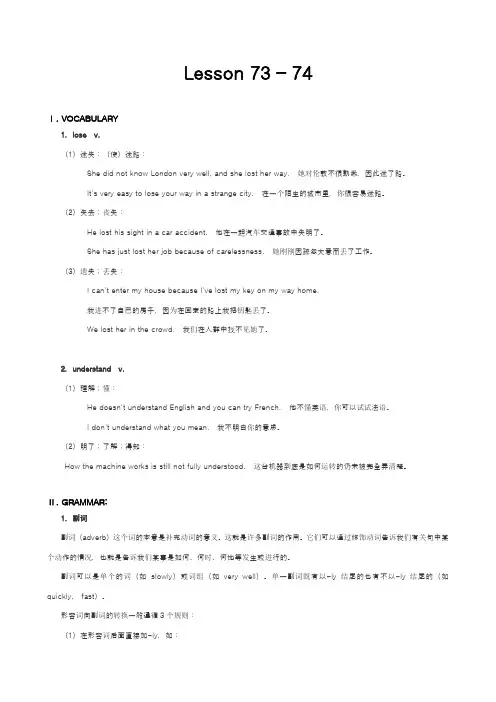
Lesson 73 – 74Ⅰ. VOCABULARY1.lose v.(1)迷失;(使)迷路:She did not know London very well, and she lost her way. 她对伦敦不很熟悉,因此迷了路。
It's very easy to lose your way in a strange city. 在一个陌生的城市里,你很容易迷路。
(2)失去;丧失:He lost his sight in a car accident. 他在一起汽车交通事故中失明了。
She has just lost her job because of carelessness. 她刚刚因疏忽大意而丢了工作。
(3)遗失;丢失:I can't enter my house because I've lost my key on my way home.我进不了自己的房子,因为在回家的路上我把钥匙丢了。
We lost her in the crowd. 我们在人群中找不见她了。
2.understand v.(1)理解;懂:He doesn't understand English and you can try French. 他不懂英语,你可以试试法语。
I don't understand what you mean. 我不明白你的意思。
(2)明了;了解;得知:How the machine works is still not fully understood. 这台机器到底是如何运转的仍未被完全弄清楚。
Ⅱ. GRAMMAR:1.副词副词(adverb)这个词的本意是补充动词的意义。
这就是许多副词的作用。
它们可以通过修饰动词告诉我们有关句中某个动作的情况,也就是告诉我们某事是如何、何时、何地等发生或进行的。
副词可以是单个的词(如slowly)或词组(如very well)。
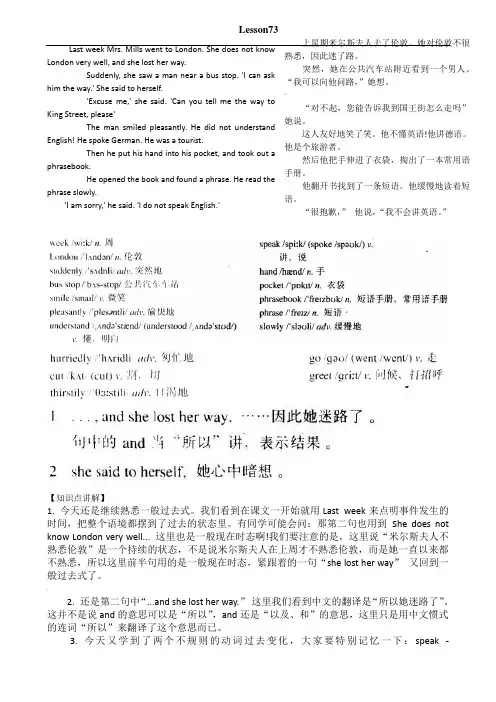
【知识点讲解】1. 今天还是继续熟悉一般过去式。
我们看到在课文一开始就用Last week 来点明事件发生的时间,把整个语境都摆到了过去的状态里。
有同学可能会问:那第二句也用到 She does not know London very well... 这里也是一般现在时态啊!我们要注意的是,这里说“米尔斯夫人不熟悉伦敦”是一个持续的状态,不是说米尔斯夫人在上周才不熟悉伦敦,而是她一直以来都不熟悉,所以这里前半句用的是一般现在时态,紧跟着的一句“she lost her way ” 又回到一般过去式了。
,2. 还是第二句中“...and she lost her way.” 这里我们看到中文的翻译是“所以她迷路了”。
这并不是说and 的意思可以是“所以”,and 还是“以及、和”的意思,这里只是用中文惯式的连词“所以”来翻译了这个意思而已。
3. 今天又学到了两个不规则的动词过去变化,大家要特别记忆一下:speak -Lesson73Last week Mrs. Mills went to London. She does not know London very well, and she lost her way.Suddenly, she saw a man near a bus stop. 'I can ask him the way.' She said to herself.'Excuse me,' she said. 'Can you tell me the way to King Street, please'The man smiled pleasantly. He did not understand English! He spoke German. He was a tourist.Then he put his hand into his pocket, and took out a phrasebook.He opened the book and found a phrase. He read the phrase slowly.'I am sorry,' he said. 'I do not speak English.' 上星期米尔斯夫人去了伦敦。
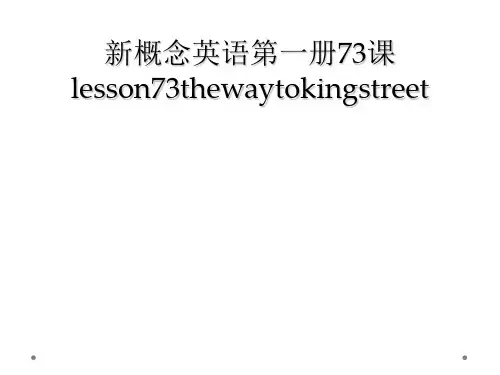
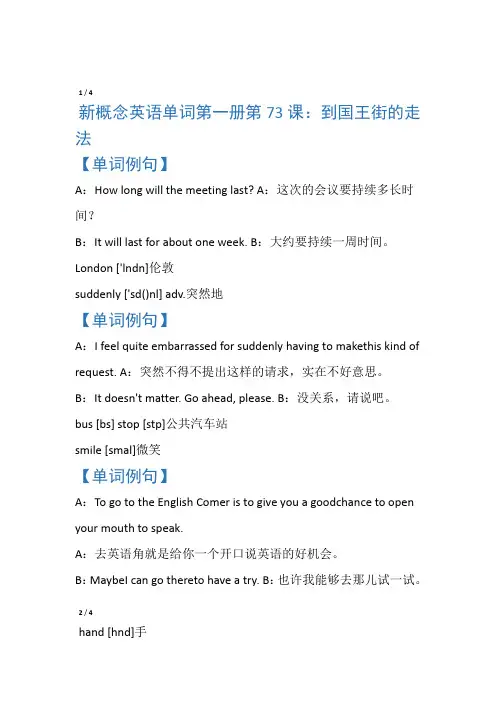
1 / 4新概念英语单词第一册第73课:到国王街的走法【单词例句】A:How long will the meeting last? A:这次的会议要持续多长时间?B:It will last for about one week. B:大约要持续一周时间。
London ['lndn]伦敦suddenly ['sd()nl] adv.突然地【单词例句】A:I feel quite embarrassed for suddenly having to makethis kind of request. A:突然不得不提出这样的请求,实在不好意思。
B:It doesn't matter. Go ahead, please. B:没关系,请说吧。
bus [bs] stop [stp]公共汽车站smile [smal]微笑【单词例句】A:To go to the English Comer is to give you a goodchance to open your mouth to speak.A:去英语角就是给你一个开口说英语的好机会。
B:MaybeI can go thereto have a try. B:也许我能够去那儿试一试。
2 / 4hand [hnd]手【派生词】handkerchief手帕【单词扩充】arm手臂【单词搭配】hand in hand手牵于hands up举手give a hand协助【单词例句】A:Hold the steering wheel with your hands at teno'clock and two o'clock. A.把手握在方向盘的10点及2点钟方向。
B:And what shallI do then? B:我接着该这么做?pleasantly ['plezntli]adv愉快地understand ['plezntli]懂,明白【派生词】understanding理解nusunderstand误解【单词搭配】understand each other互相了解【单词例句】A:We have to be fair about these things A:对这种事情,我们一视同仁。
新概念英语第一册Lesson73~74语法及单词精讲语法 Grammar in use1.副词副词(adverb)这个词的本意是补充动词的意义。
这就是许多副词的作用。
它们可以通过修饰动词告诉我们有关句中某个动作的情况,也就是告诉我们某事是如何、何时、何地等发生或进行的。
副词可以是单个的词(如 slowly)或词组(如 very well)。
单一副词既有以-ly结尾的也有不以-ly结尾的(如 quickly, fast)。
形容词向副词的转换一般遵循3个规则:(1)在形容词后面直接加-ly,如:quick----quicklyhurried----hurriedlypleasant----pleasantlywarm----warmly(2)以-y结尾的形容词,则把-y改成-i,再加-ly,如:thirsty----thirstilyhappy----happily(3)形容词与副词形式相同:late----latefast----fasthard----hardwell----well2.部分不规则动词的过去式形式go----wentsee----sawunderstand----understood take----tookread----readdrink----drankrun----ranknow----knewsay----saidput----putcut----cuteat----atemeet----metcome----camelose----losttell----toldspeak----spokefind----foundgive----gaveswim----swamhave----had词汇学习 Word study1.lose v.(1)迷失;(使)迷路:She did not know London very well, and she lost her way.她对伦敦不很熟悉,因此迷了路。
新概念第一册73课★week n. 周this week, last week等,前面不能加介词the week before last 上上周the week after next 下下周★suddenly 既可以放在句首,也可以放在句中或句末。
I suddenly remembered that I didn't bring my key.★smile n. &v. 笑Look, she is smiling at me. She had a warm smile on her face.smile a…smile She smiled a pleasant smile=She smiled pleasantly她愉快地笑了★hand n. 手v .交出,传递•give sb. a (big) hand 帮助某人•on the one hand 一方面•on the other hand 另一方面•hand in hand 手拉手•hand in 上交交付•hand over to移交给★lose v. (使)迷路,遗失,失去(lost—lost)•lose one’s way 迷路•lose sight of 看不见•lose heart失去信心,泄气•lose weight减肥•lose oneself in沉迷于,专心于•be lost in 迷恋于,专心于★speak-spoke-spoken 说某种语言speak English•frankly/generally/strictly/eaxactly speaking坦率/一般/严格/确切地说•speak ill/badly/well/highly of 说…坏/好话认为…坏/好讲解1.She does not know London very well, and she lost her way.and 此处指的是“因此,所以”Come upstairs and see it. 这里的and指的是“目的”•know …well 对……了解我对他不是很了解。
【导语】新概念系列教材的经典早已不⾔⽽喻。
其⽂章短⼩精悍,语句幽默诙谐,语法全⾯系统,历来被公认为是适合⼤多数中学⽣课外学习的资料之⼀。
⽆忧考为您整理了以下内容,仅供参考。
希望可以帮助到您!如果您想要了解更多相关内容,欢迎关注⽆忧考!新概念英语第⼀册Lesson73~74课⽂详注 1.She does not know London very well. 她对伦敦不很熟悉。
know…well这⼀短语意为"对……了解"。
⼜如: I don't know him very well. 我不太了解他。
2.…and she lost her way. …因此她迷路了。
句中的 and当"所以"讲,表⽰结果。
lose one's way, 迷路。
3.ask(sb.) the way, (向某⼈)问路。
4.say to oneself, ⼼中暗想。
注意:talk to oneself意为"⾃⾔⾃语地说"。
5.Can you tell me the way to King Street, please? 您能告诉我到国王街怎么⾛吗? tell sb. the way(to), 告诉某⼈(去……的)路。
6.cut himself= cut his face。
以整体代替部分是英语中的⼀种修辞格,叫提喻(merism )。
新概念英语第⼀册Lesson75~76课⽂详注 1.Do you have any shoes like these? 像这样的鞋你们有吗? 这个句⼦⾥的 like these是介词短语作定语,修饰 shoes,意思是"像这样的鞋⼦"。
2. What size? 什么尺码的? 这是⼀个省略句,后⾯省略了 do you want。
下⽂中的 What colour? 同样也是省略句。
what size通常⽤来询问服装、鞋⼦、⼿套等的尺⼨,即什么号码: What size do you wear? 你穿⼏码的? 3.They are very uncomfortable.的确很不舒适。
【知识点讲解】
1. 今天还是继续熟悉一般过去式。
我们看到在课文一开始就用Last week 来点明事件发生的
时间,把整个语境都摆到了过去的状态里。
有同学可能会问:那第二句也用到 She does not know London very well... 这里也是一般现在时态啊!我们要注意的是,这里说“米尔斯夫人不熟悉伦敦”是一个持续的状态,不是说米尔斯夫人在上周才不熟悉伦敦,而是她一直以来都不熟悉,所以这里前半句用的是一般现在时态,紧跟着的一句“she lost her way ” 又回到一般过去式了。
2. 还是第二句中“...and she lost her way.” 这里我们看到中文的翻译是“所以她迷路了”。
这并不是说and 的意思可以是“所以”,and 还是“以及、和”的意思,这里只是用中文惯式的连词“所以”来翻译了这个意思而已。
3. 今天又学到了两个不规则的动词过去变化,大家要特别记忆一下:speak - spoke;understand - understood 。
另外再顺便记一个:stand - stood ,站立。
Lesson73
Last week Mrs. Mills went to London. She does not know London very well, and she lost her way.
Suddenly, she saw a man near a bus stop. 'I can ask him the way.' She said to herself.
'Excuse me,' she said. 'Can you tell me the way to King Street, please?'
The man smiled pleasantly. He did not understand English! He spoke German. He was a tourist.
Then he put his hand into his pocket, and took out a phrasebook.
He opened the book and found a phrase. He read the phrase slowly.
'I am sorry,' he said. 'I do not speak English.' 上星期米尔斯夫人去了伦敦。
她对伦敦不很熟悉,因此迷了路。
突然,她在公共汽车站附近看到一个男人。
“我可以向他问路,”她想。
“对不起,您能告诉我到国王街怎么走吗?”她说。
这人友好地笑了笑。
他不懂英语!他讲德语。
他是个旅游者。
然后他把手伸进了衣袋,掏出了一本常用语手册。
他翻开书找到了一条短语。
他缓慢地读着短语。
“很抱歉,” 他说,“我不会讲英语。
”。